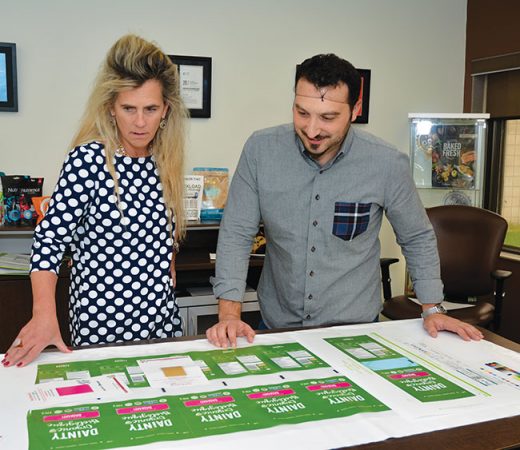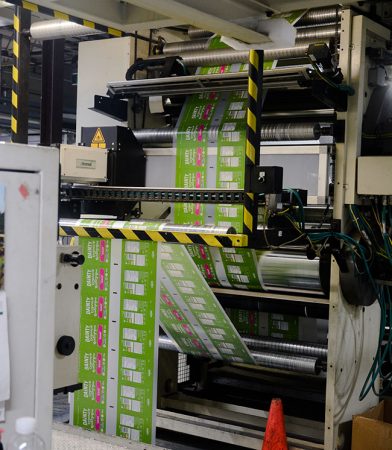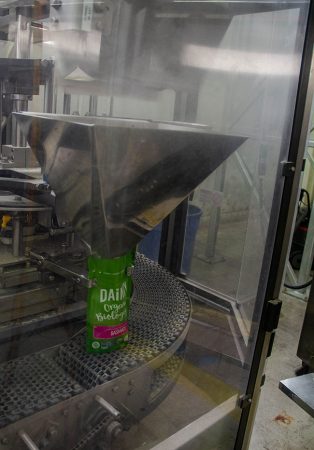
Grains of truth
Alanna Fairey
Food Safety Sustainability Coding & Labeling Film Flexibles Plastic Printing Guilt-Free Packaging HarmonyPack Les Aliments Dainty Foods Inc. Marbour Group Mount Royal Rice Mills Organics Pigeon Brands Inc. Tempo Plastics Limited TotaniDry rice manufacturing company seeks out new packaging in an effort to reduce carbon footprint
With Canadian consumers becoming increasingly more educated about proactive sustainable practices whilst seeking out healthier alternatives to their everyday diets, it is not surprising that many progressive CPG (consumer packaged goods) businesses are overhauling their strategies to meet these demands.
Headquartered in Montreal, Canada’s sole rice milling and manufacturing company Les Aliments Dainty Foods Inc. has been quick to recognize these evolving consumer demands with the forthcoming launch of its new Organics line of processed rice in early summer, which will be retailed in fully-recyclable flexible packaging manufactured by Tempo Plastics Limited of Innisfil, Ont.
Founded in Montreal way back in 1882 by Robert Reford on the Lachine Canal, the company ran its production operations there for decades under its original Mount Royal Rice Mills banner until a major change to existing tariff duties allowed for large-scale importation of raw rice to Canada from the U.S.
That landmark change prompted the company to build a new processing facility in the southwestern Ontario border city of Windsor, which would benefit from easy cross-border rail car access to keep the imported rice flowing freely.
Completed in 1967, the 130,000-square-foot facility—owned by Marbour Group since 2015—nowadays employs about 40 unionized and 24 salaried staff, with the company founder’s descendent Nikola Reford keeping the original family roots alive in her role as the company’s marketing director.

Dainty Foods marketing director Nikola Reford and Tempo Plastics vice-president of marketing and product development Leonardo Giglio reviewing color proofs of the flexible packaging before approving it for production.
“We want to make consumers life as simple as possible, so we hope to show them that there are easy, tasty ways to prepare rice,” Reford told Canadian Packaging in a recent interview, describing her company’s products as “healthier food comes out of your own kitchen.”
As Reford relates, the certified gluten-free Windsor facility boasts the coveted internationally-recognized SQF (Safety Quality Food) certification, that is consistently maintained and validated by dedicated effort of the plant’s in-house Quality Assurance Department.
According to Dainty, the company’s dry rices are 100-percent natural product that contain no artificial additives or GMOs (genetically-modified organisms), while boasting valid Kosher certification across the full product porfolio, along with Organic certification for some select products.
Back in 2016, Dainty enlisted the help of leading Canadian branding and design agency Pigeon Brands Inc. to redesign their brand and packaging for an upcoming product relaunch. Pleased with their work, Dainty has continued its partnership with Pigeon Brands.
“Packaging is key to our marketing,” says Reford. “Our packaging is our face to the world, to our consumers and buyers, and it must reflect our conviction of finding the best environmental solutions for all that we do at Dainty,” Reford asserts.
“To date, the packaging evolution has only been held back by availability, and Dainty is ready to evolve.”
Part of this evolution included finding a film pouch that was sustainable and fully recyclable, to align with the values of the brand-new Organics line, which will be the company’s first line that is going to be in this truly recyclable packaging.
“Several years ago, we were printing a lot of different SKUs (stock keeping units) and had a number of issues with the printer we were using,” Reford explains.
“We then began interviewing other printers.”
After Dainty discovered the Innisfil, Ont.-based Tempo Plastics Limited a few years back, a partnership was born.
“Tempo Plastics has been the key to enabling us to launch an Organics line in a recyclable film pouch,” Reford extols.
“We are very excited to be the first in the market to do so and we are already trialling recyclable film on other packaging lines.”
A leading supplier of flexible packaging solutions, such as pouches, rollstock and poly bags, Tempo Plastics makes it their goal to produce environmentally friendly packaging without compromising food safety at their 100,000-square-feet facility.
“We’re working towards better,” Leonardo Giglio, vice-president, marketing & product development of Tempo Plastics, says.
“At Tempo, we are doing our best to minimize waste, and while minimizing waste is nothing new, it’s good business practice and we want to be promoting that as much as we can.
“We just want to continue down the path of showing different solutions to people.”

A KBA-FlexoTecnica flexo press running the flexible packages at Tempo Plastics’ Innisfil, Ont.-based production facility before it is shipped to Dainty’s Windsor, Ont.-based production facility.
Sustainability in packaging has become a hot-button topic in the past year.
Thanks to advancements in packaging technology, suppliers like Tempo are able to offer Dainty standup resealable pouches from their new brand, HarmonyPack, which Tempo feels is the future of circular economy packaging.
“We think it’s the perfect harmony of what people have been asking for these last couple of years,” Giglio told Canadian Packaging on a recent visit to the lively 133-employee facility.
“I think we have a serious contender for a solution on the end life side, which has always been the biggest challenge for flexible packaging.”
As part of Tempo’s Guilt-Free Packaging line, the HarmonyPack pouch solutions are made from number two polyethylene and also offer full HD Graphics and barrier if needed for shelf-stable products.
In addition, HarmonyPack is certified to use the esteemed how2recycle logo, a standardized labeling system that visibly communicates recycling instructions to the public to offer reliable and transparent on-package recycling information to customers in North America.
Impressed by Tempo’s commitment to sustainability and progressive mindset, Dainty Foods hopes to use the HarmonyPack material for all of their brands.
“We’re hoping to get all of our product into this kind of film by the end of the year,” Reford explains.
“We are trialling some of the Tempo film on some of our block bottom bag machines, and it’s really important that we produce as little waste as possible.”
For Giglio, the creation of the HarmonyPack pouches serve as a way for Tempo Plastics to educate consumers about what their options are with the package they are using at the time of disposal.
“We started showing people this year and so far there’s been a lot of interest, a lot more activity and we expect that to continue,” Giglio says with an exuberant smile.
“All we can do is design things better, give opportunities to people to use it at the end and hope that the innovation will follow with more recycling options.
Adds Giglio: “If we wait for the recycling innovation to be here, we’re never going to have anything, so why don’t we start making alternatives today?”
Prior to production, Tempo and Dainty collaborate together on the format that they would like to bring to market, with Dainty providing Tempo with the size and weight that they want for the stand-up resealable pouches.
Once the sizing exercises are complete, Pigeon designs according to Dainty specs and then Tempo produces colour proofs.
Once final, Giglio’s team then creates print plates with the approved colors, fonts and logos.

After the HarmonyPack pouches have been shipped to Dainty, they are guided to one of the plant’s fill hoppers, where the bags are filled with basmati rice.
The specialty film is co-extruded together to form a homogenous material, thus beginning its transformative evolution into the HarmonyPack pouches.
After it completes the final stage on the Totani pouchmaking machine, Tempo then ships the HarmonyPack pouches to Dainty’s Windsor facility, where the rice is waiting to fill after being processed through rigorous cleaning and/or milling steps.
The rice is then guided to the fill hoppers for specific packaging machines and packaging will run at varying fill speeds, depending on the machine and the size of the package.
The packaged rice is then conveyed to cases, a palletizer and finally rests in its place in Dainty’s on-site warehouse before it is shipped for retail distribution.
Deep commitment to sustainable packaging aside, both Giglio and Reford agree that the working relationship between Dainty and Tempo has been smooth sailing thanks to a collaborative effort on both sides.
“It has been a great synergy between the two businesses and I’m excited that they are one of the early adopters for this fully recyclable material,” Giglio praises.
“We are focused on high-end printing and Dainty sees that as the value in a supplier and they want their brand to look and resonate a certain way and we do our best to make sure that we have their message come true on shelves.”
Reford recalled several occasions where sales representatives from Tempo made the long drive to Windsor to hand deliver the finished pouches, which indicates Tempo going far above the ordinary to match client expectations and values.
“We are a small Canadian company and so is Tempo,” Reford reflects.
“I think in that sense we make good partners, because there is no hierarchy—everybody works together, and I hope this will be a long partnership.”
Moving forward, both Tempo and Dainty will continue to educate customers about fully recyclable packaging through their continued efforts and everyday practices.
“We are the David, not the Goliath of the Flexible Packaging industry––our ability to adapt quickly will continue to be one of our strengths,” Giglio elucidates.
“We want to really push the envelope and see how far can we take this.”
Concludes Reford: “Part of the issue is education—If we can do our little part in helping people make greener decisions, then that is a big accomplishment for us.”
Advertisement

